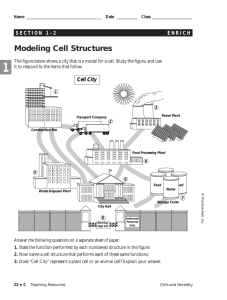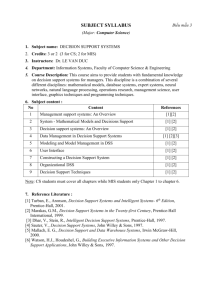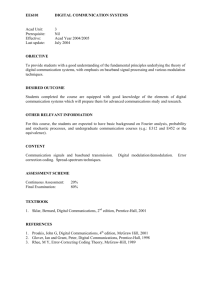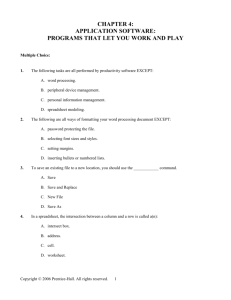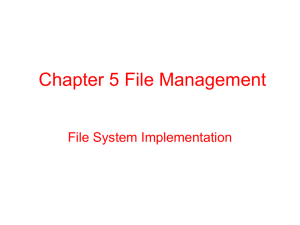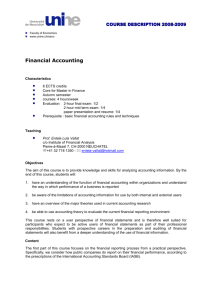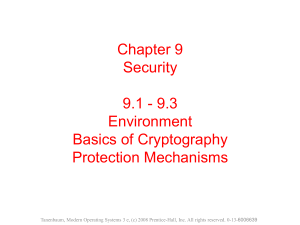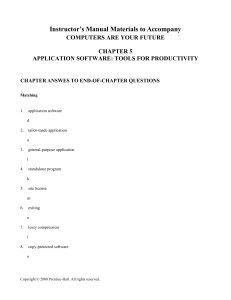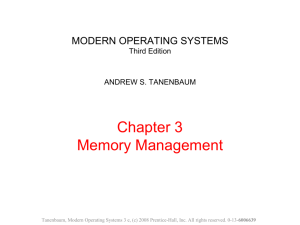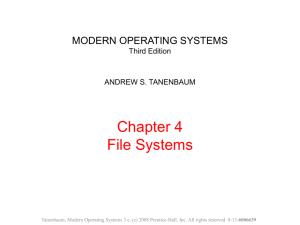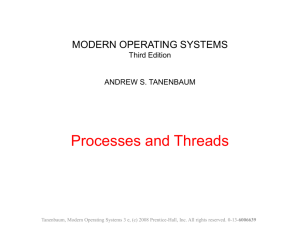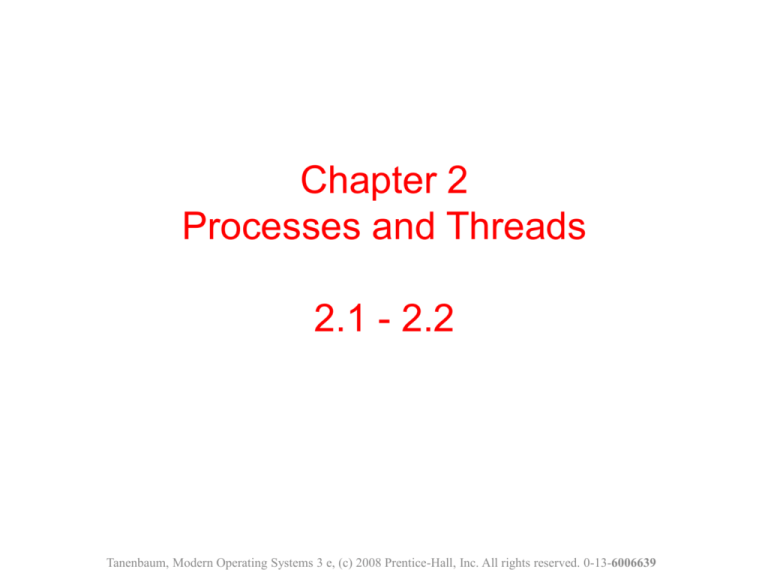
Chapter 2
Processes and Threads
2.1 - 2.2
Tanenbaum, Modern Operating Systems 3 e, (c) 2008 Prentice-Hall, Inc. All rights reserved. 0-13-6006639
The Process Model
Figure 2-1. (a) Multiprogramming of four programs. (b) Conceptual
model of four independent, sequential processes. (c) Only one
program is active at once.
Tanenbaum, Modern Operating Systems 3 e, (c) 2008 Prentice-Hall, Inc. All rights reserved. 0-13-6006639
Process Creation
Events which cause process creation:
•
•
•
•
System initialization.
Execution of a process creation system call by a running
process.
A user request to create a new process.
Initiation of a batch job.
Tanenbaum, Modern Operating Systems 3 e, (c) 2008 Prentice-Hall, Inc. All rights reserved. 0-13-6006639
Process Termination
Events which cause process termination:
•
•
•
•
Normal exit (voluntary).
Error exit (voluntary).
Fatal error (involuntary).
Killed by another process (involuntary).
Tanenbaum, Modern Operating Systems 3 e, (c) 2008 Prentice-Hall, Inc. All rights reserved. 0-13-6006639
Process States
Figure 2-2. A process can be in running, blocked, or ready state.
Transitions between these states are as shown.
Tanenbaum, Modern Operating Systems 3 e, (c) 2008 Prentice-Hall, Inc. All rights reserved. 0-13-6006639
Implementation of Processes (1)
Figure 2-3. The lowest layer of a process-structured operating
system handles interrupts and scheduling. Above that layer
are sequential processes.
Tanenbaum, Modern Operating Systems 3 e, (c) 2008 Prentice-Hall, Inc. All rights reserved. 0-13-6006639
Implementation of Processes (2)
Figure 2-4. Some of the fields of a typical process table entry.
Tanenbaum, Modern Operating Systems 3 e, (c) 2008 Prentice-Hall, Inc. All rights reserved. 0-13-6006639
Implementation of Processes (3)
Figure 2-5. Skeleton of what the lowest level of the operating
system does when an interrupt occurs.
Tanenbaum, Modern Operating Systems 3 e, (c) 2008 Prentice-Hall, Inc. All rights reserved. 0-13-6006639
Modeling Multiprogramming
Figure 2-6. CPU utilization as a function of the number of
processes in memory.
Tanenbaum, Modern Operating Systems 3 e, (c) 2008 Prentice-Hall, Inc. All rights reserved. 0-13-6006639
Thread Usage (1)
Figure 2-7. A word processor with three threads.
Tanenbaum, Modern Operating Systems 3 e, (c) 2008 Prentice-Hall, Inc. All rights reserved. 0-13-6006639
Thread Usage (2)
Figure 2-8. A multithreaded Web server.
Tanenbaum, Modern Operating Systems 3 e, (c) 2008 Prentice-Hall, Inc. All rights reserved. 0-13-6006639
Thread Usage (3)
Figure 2-9. A rough outline of the code for Fig. 2-8. (a) Dispatcher
thread. (b) Worker thread.
Tanenbaum, Modern Operating Systems 3 e, (c) 2008 Prentice-Hall, Inc. All rights reserved. 0-13-6006639
Thread Usage (4)
Figure 2-10. Three ways to construct a server.
Tanenbaum, Modern Operating Systems 3 e, (c) 2008 Prentice-Hall, Inc. All rights reserved. 0-13-6006639
The Classical Thread Model (1)
Figure 2-11. (a) Three processes each with one thread. (b) One
process with three threads.
Tanenbaum, Modern Operating Systems 3 e, (c) 2008 Prentice-Hall, Inc. All rights reserved. 0-13-6006639
The Classical Thread Model (2)
Figure 2-12. The first column lists some items shared by all threads
in a process. The second one lists some items private to each
thread.
Tanenbaum, Modern Operating Systems 3 e, (c) 2008 Prentice-Hall, Inc. All rights reserved. 0-13-6006639
The Classical Thread Model (3)
Figure 2-13. Each thread has its own stack.
Tanenbaum, Modern Operating Systems 3 e, (c) 2008 Prentice-Hall, Inc. All rights reserved. 0-13-6006639
POSIX Threads (1)
Figure 2-14. Some of the Pthreads function calls.
Tanenbaum, Modern Operating Systems 3 e, (c) 2008 Prentice-Hall, Inc. All rights reserved. 0-13-6006639
POSIX Threads (2)
...
Figure 2-15. An example program using threads.
Tanenbaum, Modern Operating Systems 3 e, (c) 2008 Prentice-Hall, Inc. All rights reserved. 0-13-6006639
Implementing Threads in User Space
Figure 2-16. (a) A user-level threads package. (b) A threads
package managed by the kernel.
Tanenbaum, Modern Operating Systems 3 e, (c) 2008 Prentice-Hall, Inc. All rights reserved. 0-13-6006639
Hybrid Implementations
Figure 2-17. Multiplexing user-level threads
onto kernel-level threads.
Tanenbaum, Modern Operating Systems 3 e, (c) 2008 Prentice-Hall, Inc. All rights reserved. 0-13-6006639
Pop-Up Threads
Figure 2-18. Creation of a new thread when a message arrives. (a)
Before the message arrives.
(b) After the message arrives.
Tanenbaum, Modern Operating Systems 3 e, (c) 2008 Prentice-Hall, Inc. All rights reserved. 0-13-6006639
Making Single-Threaded Code
Multithreaded (1)
Figure 2-19. Conflicts between threads
over the use of a global variable.
Tanenbaum, Modern Operating Systems 3 e, (c) 2008 Prentice-Hall, Inc. All rights reserved. 0-13-6006639
Making Single-Threaded Code
Multithreaded (2)
Figure 2-20. Threads can have private global variables.
Tanenbaum, Modern Operating Systems 3 e, (c) 2008 Prentice-Hall, Inc. All rights reserved. 0-13-6006639

